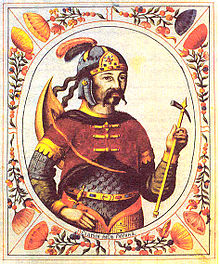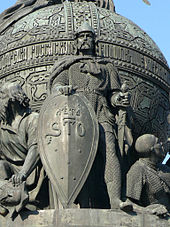Rjurik
Rjurik (German also Rurik ; in Cyrillic script Рюрик; Old Norse Hrœrikr , 'famous ruler'; * around 830, † around 879) was a Warsaw prince and is considered the founder of the old Russian state of Kievan Rus .
He is said to have ruled over Novgorod and the land between the Neva and Oka rivers from 862 to 879 . His successor is Oleg the Wise , who is said to have ruled Rjurik's son Igor .
Whether Rjurik is a real person or just a legend has been a matter of dispute in historical studies for several centuries. In the last few years German and Russian archaeologists have excavated his presumed mansion in Rurikowo Gorodishche . However, it has so far been largely certain that Old Ladoga was the most important base of the early Varangians in the Slavic region. The presence of Scandinavians in the settlement of Old Ladoga has been archaeologically proven from 750 AD .
At best, Rjurik's identification with the Danish Viking Rorik , who according to Franconian chronicles lived in the Frisian Dorestad , can be regarded as speculation . Rjurik was possibly just a personification of the Scandinavians who moved to later Russia in the 9th century, partly as mercenaries of Slavic nobles and partly as conquerors.
Almost all grand dukes and princes of the entire Kievan Rus traced their descent to Rjurik or his two brothers Sineus and Truwor . Named after Rjurik dynasty of Rjurikiden prevailed until the late 16th century over Russia .
A Russian brig was named after Rjurik , which on behalf of Count Nikolai Rumjanzew undertook a circumnavigation to explore the Northwest Passage from 1815 to 1818 (see Rurik expedition ).
See also
| predecessor | Office | successor |
|---|---|---|
| - |
Russian ruler 862–879 |
Oleg |
| personal data | |
|---|---|
| SURNAME | Rjurik |
| ALTERNATIVE NAMES | Rurik; Hrørikr; Рюрик |
| BRIEF DESCRIPTION | Prince of Varangians is considered the founder of Russia |
| DATE OF BIRTH | around 830 |
| DATE OF DEATH | at 879 |

